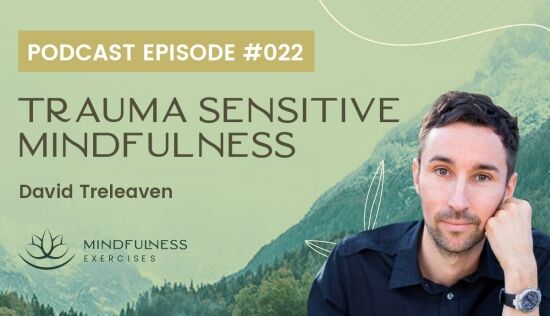Listen now

How many people do you know who have experienced trauma? According to research, at least 90% of us will live through trauma at some point in our lives. For mindfulness and meditation teachers, this means it’s likely that no matter the context in which we teach, someone in the room will have a history of trauma.
In this episode of the Mindfulness Exercises Podcast, Sean Fargo speaks with author, educator and trauma professional David Treleaven on the importance of minimizing harm in our efforts to help others, and what it really means to be a trauma-sensitive mindfulness teacher.
Please note that any conversation about trauma can be evocative. As you listen, remain mindful and self-responsive and take breaks as you need them.
Sponsored by our Mindfulness Meditation Teacher Certification Program
MindfulnessExercises.com/Certify
Show Notes:
Why mindfulness doesn’t work for everyone
Not everyone will experience mindfulness and meditation in the same way. This includes those with a history of trauma. Even two people with symptoms of PTSD might have considerably different reactions to contemplative practices. For some, mindfulness and meditation offer near-immediate relief. For others, the process of turning attention inward can be painful and retraumatizing. David Treleaven has spent his career working toward a better understanding of these divergent experiences, and how, as teachers, we can ensure the best outcomes for our students.
“The teacher, who is not trained in trauma, basically says, ‘if you stick with it, this will untangle for you, so I encourage you to just go back to the cushion.’ And so the person does and despite their best efforts it’s not working, and so they end up feeling both dysregulated, but also somewhat ashamed. It’s like they brought the best of intentions to practice, and even then, they couldn’t have a positive experience, and even meditation caused trouble.”
Understanding trauma
Trauma may be easily understood as a spectrum. On one end is stress, something we each contend with daily. Then there’s traumatic stress, post-traumatic stress, and at the far opposite end of spectrum is PTSD, a diagnosed disorder. Trauma can be the result of a single direct experience, witnessing or hearing about the experience of another, or the result of repeated exposure to stressful situations. Understanding the wide range of trauma can help us understand its prevalence, and make us better equipped to recognize it.
“There is a wide spectrum here and international research says that minimum 90% of us will live through a traumatic event in our lifetimes. [...] And what I wanted to highlight here is that in any room where you are offering meditation practice, to me, it’s a safe bet that there will be someone there on the spectrum who may be struggling with trauma.”
What it means to be a trauma-sensitive teacher
A trauma-sensitive teacher is not trained in diagnosing PTSD, nor are they necessarily trained in trauma-focused mindfulness or meditation. Trauma-sensitivity is training in minimizing harm. Apart from realizing how widespread trauma is, could you recognize the symptoms of trauma in a student or client, inside of their mindfulness practice? Would you be surprised if someone came to you to say they were struggling, and would you know how to skillfully respond?
“If you’re aware of trauma and you’ve done some work around it to become trained in trauma-informed practice then you just have more tools and you’ll be prepared. And [trauma] is nothing to be afraid of, and it’s useful to expect that it will arise.”
The potential of working with difficult material
Any contemplative practice, including mindfulness and meditation, potentially evokes trauma. By purposefully turning our attention inward to sensations in the body, thoughts and emotions, we expose ourselves to an inner world which doesn’t always seem safe. And yet, research shows that expanding our capacity to remain present with uncomfortable feelings is incredibly healing. A teacher trained in trauma-sensitivity can more skillfully help students navigate through the dynamic and transformative space between fear and safety.
“There are some people that might end up feeling overwhelmed inside of practice. So what would they need to not go down kind of a pitfall or a sinkhole in practice? And then how can we leverage practice towards trauma recovery and transformation?”
On being a teacher struggling with your own trauma
David describes an experience with Babette Rothschild, author of The Body Remembers, during which she asked a room of trauma therapists, ‘how many of you have resolved your trauma?’ No one raised their hand. This does not make us less effective practitioners. In fact, a willingness to be vulnerable and share our own challenges with our students can help the space we teach in feel more authentic and safe. That said, it’s our responsibility to continue to put effort into our own healing, and to take the time for self-care as needed.
“I just want to normalize the experience of people saying I’m a person who works with trauma, I have my own trauma, and I need to work it as best as I can and there might be times when I’m actually out of pocket. Like, I actually just need some space from it. I would want to normalize that.”
Resources
About Giovanni Dienstmann
David Treleaven is a writer, educator, and trauma professional originally from Toronto, Canada. His life’s work is training people to lead mindfulness in a trauma-sensitive way. He has made significant contributions to mindfulness teachers around the world by training thousands of people in Trauma-Sensitive Mindfulness (TSM) and his 2018 book with W. W. Norton titled Trauma-Sensitive Mindfulness is required reading for all mindfulness and meditation teachers.
His work has been adopted into multiple mindfulness teacher training programs around the world, including UCLA’s Mindful Awareness Research Center, the Engaged Mindfulness Institute, and Bangor University’s MA in Mindfulness program in the UK. He is currently a visiting scholar at Brown University.